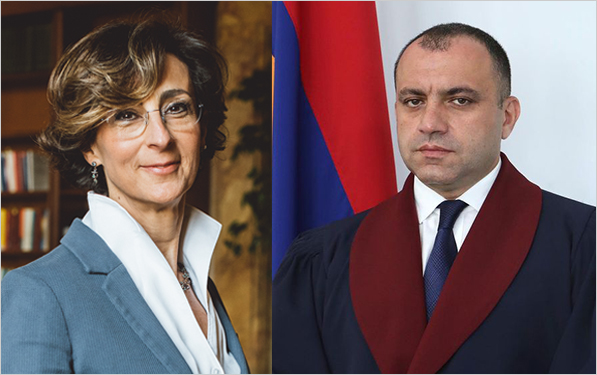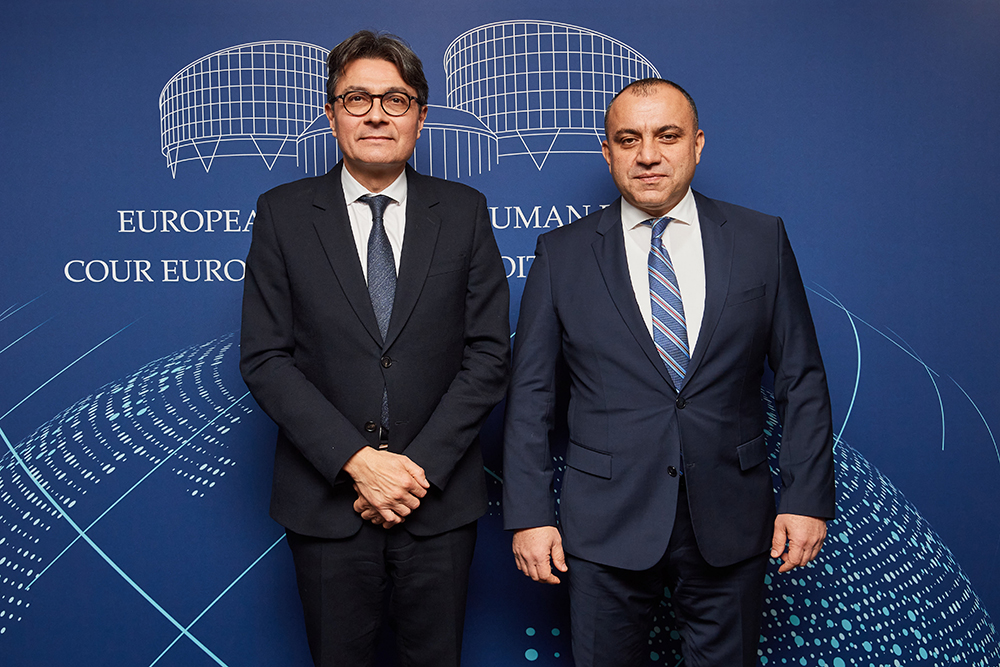
PRESS RELEASE
On March 24, 2023, the Constitutional Court of the Republic of Armenia examined the case concerning the constitutionality of the obligations prescribed by the Rome Statute of the International Criminal Court (hereinafter referred to as the “Rome Statute”) signed on July 17, 1998, as well as the statement on the retroactive recognition of the jurisdiction of the International Criminal Court in accordance with article 12, paragraph 3 of the Rome Statute, and by the Decision DCC-1680, the Constitutional Court held that the obligations prescribed therein comply with the Constitution.
Please note that the Rome Statute was signed by the Republic of Armenia on October 1, 1999, however, the ratification process of the Statue was suspended by the Decision DCC-502 of the Constitutional Court dated August 13, 2004, whereby the obligations of the Republic of Armenia arising from the principle of subsidiarity or complementarity (that serves as the basis of the jurisdiction of the ICC) as prescribed by paragraph 10 of the Preamble and article 1 of the Rome Statute, were declared non-compliant with Articles 91 and 92 of the Constitution in the 1995 edition (on the exclusivity of implementation of criminal justice by the courts prescribed by the Constitution). The obligations arising from the prohibition of pardon or amnesty of a person convicted by the ICC in accordance with article 105 of the Rome Statute, were also declared by the Constitutional Court as non-compliant with Article 40 (the right to seek pardon or mitigation of the sentence), as well as the requirements of Article 55(17) (authority of the President of the Republic to grant amnesty to the convict), and Article 81(1) (authority of the National Assembly to declare an amnesty) of the Constitution in the 1995 edition. By the Decision N 2097-A of December 29, 2022, the Government approved the legislative initiative on the draft law on the adoption of the statement on the ratification of the Rome Statute and on the approval of retroactive application of the jurisdiction of the ICC since May 10, 2021, based on article 12, paragraph 3 of the Statute, and the Government submitted an application to the Constitutional Court on January 3, 2023 for determining the constitutionality of the obligations prescribed therein.
By the Decision DCC-1680 of March 24, 2023, the Constitutional Court declared the obligations prescribed by the Rome Statute as complying with the Constitution in full, and, for preventing the possible ambiguity, the Court specifically referred to the legal positions expressed in the Decision DCC-502 adopted in 2004.
Accordingly, in part of compliance with the Constitution of the principle of subsidiarity or complementarity underlying the application of the jurisdiction of the ICC, the Constitutional Court held that the obligations prescribed by paragraph 10 of the Preamble and article 1 of the Statute comply with the Constitution in accordance with the reasoning prescribed in the same decision, namely:
(a) taking into account the coincidence of the aims pursued by the Constitution and the Rome Statute, as well as the axiology underlying the later;
(b) bearing in mind that the respect for the primacy of the criminal jurisdiction of a State Party to the Rome Statute is the essence of the principle of subsidiarity or complementarity underpinning the jurisdiction of the ICC, as prescribed by paragraph 10 of the Preamble and article 1 of the Rome Statute (which is described in detail in article 17 of the Statute), and that such an issue arises only in case of failure of the criminal jurisdiction system of the given state in pursuit of its aim;
(c) emphasizing that the faithfulness of the first constituent power of the Republic of Armenia - the Armenian people, to the “universal values” (prescribed in the preamble of the Constitution) unquestionably includes its civilizational commitment to the international cooperation in the fight against the most grave crimes causing the concern of the international community and jeopardizing global peace, well-being and impunity, which is of a constitutional imperative for the public authority of the Republic of Armenia.
As for the pardon or amnesty of a person convicted by the ICC, the Constitutional Court found that the obligations of the state under article 105 of the Rome Statute in relation to serving a sentence of imprisonment by the ICC do not directly arise from the ratification of the Statute, and the State Party voluntarily undertakes such obligations under certain conditions which are missing in the case of Armenia. Therefore, the obligations prescribed by article 105 of the Rome Statute may not be considered as “obligations established by an international treaty” in the sense of Article 168(3) of the Constitution, since by ratifying the Rome Statute, no direct obligations arise for the Republic of Armenia, and such obligations arise only by virtue of other international treaties, however, no such issue was considered in this case.
The full version of the Decision DCC-1680 of the Constitutional Court will be promulgated in accordance with the law.
The Constitutional Court is promulgating the final part of the Decision DCC-1680 (available at https://youtu.be/YpvnevU3BBo).
News

3 February 2026
THE PRESIDENT OF THE CONSTITUTIONAL COURT OF THE REPUBLIC OF ARMENIA MET WITH THE DIRECTOR OF HUMAN RIGHTS OF THE COUNCIL OF EUROPE

3 February 2026
THE PRESIDENT OF THE CONSTITUTIONAL COURT OF THE REPUBLIC OF ARMENIA MET WITH THE PRESIDENT OF THE VENICE COMMISSION

2 February 2026
THE PRESIDENT OF THE CONSTITUTIONAL COURT PARTICIPATED IN THE OPENING OF THE JUDICIAL YEAR OF THE EUROPEAN COURT OF HUMAN RIGHTS IN STRASBOURG

2 February 2026
MEETING OF THE PRESIDENT OF THE CONSTITUTIONAL COURT OF THE REPUBLIC OF ARMENIA AND THE PRESIDENT OF THE EUROPEAN COURT OF HUMAN RIGHTS IN STRASBOURG

20 January 2026
THE ROLE OF STATE AUTHORITIES AND CIVIL SOCIETY IN THE IMPLEMENTATION OF THE DECISIONS OF THE CONSTITUTIONAL COURT

The website of the Constitutional Court of the Republic of Armenia has been created as part of the Partnership for Good Governance (PGG II) Project ''Support to the judicial reform – enhancing the independence and professionalism of the judiciary in Armenia'' co-funded by the European Union and the Council of Europe. The views expressed herein can in no way be taken to reflect the official opinion of either party.

The upgrade of the official website of the Constitutional Court of the Republic of Armenia is made possible by the support of the American People through the United States Agency for International Development (USAID) as a part of the USAID/Armenia Justice Sector Support Project. The content of this website is the sole responsibility of the Constitutional Court and does not necessarily reflect the views of USAID or the United States Government.




